This post covers everything you need to know about Korean Business Etiquette.
It explains how to have a successful business meeting including:
- What to wear
- What to say
- What to bring
I worked at a Korean company for 5 years and started a business I’ve been running since 2013.
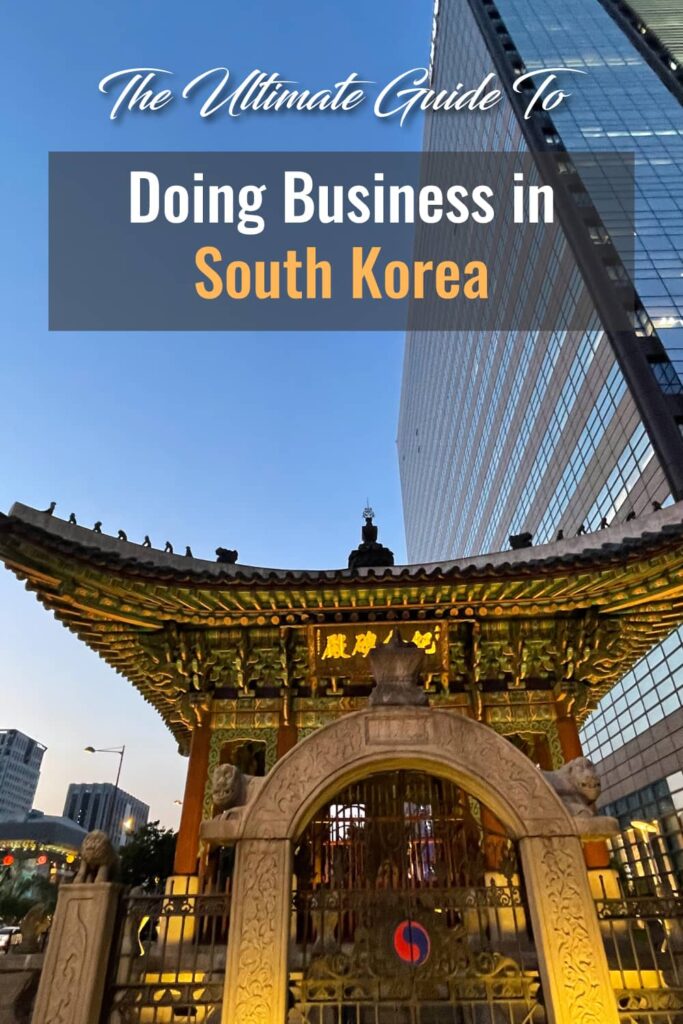
Key Takeaways
- A close relationship is the key to doing business in South Korea.
- It’s important to bring a small gift to a meeting.
- After the meeting, there will be wining and dining.
Essential Tips for Doing Business in South Korea
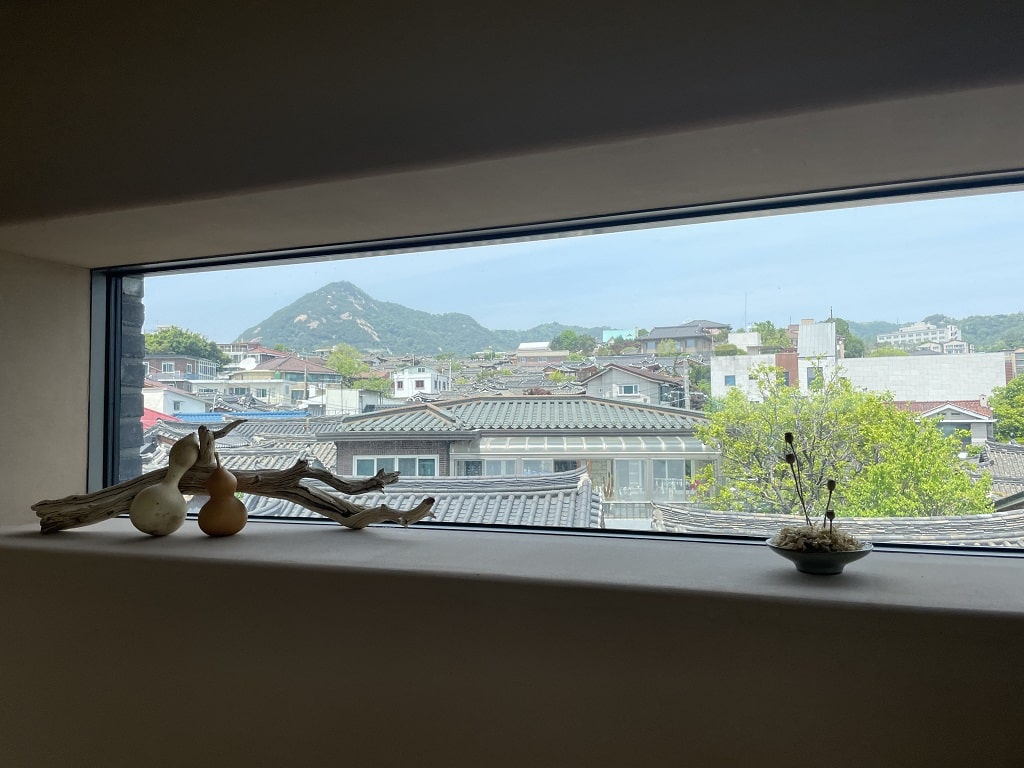
Korean business culture is influenced by four principles:
- Gibun (기분) – mood and feelings. If the mood is good, things will be easier. If the mood is bad, you’ll want to stop for the day and pick up later.
- Jeong (정) – unspoken bond. Build these through showing empathy and interacting during informal situations like meals.
- Chaemyeon (체면) – face or reputation. It’s very important that you establish yours and build up others.
- Nunchi (눈치) – intuition and emotional intelligence. Use your perception to gauge interest, hierarchy and etiquette.
Koreans are individuals, so your experience will vary.

Before You Meet
Background Information

- Korean Business Etiquette is based on Confucianism and Military Hierarchy.
- There’s some overlap with Japanese Business Culture, since some job titles are similar.
- Your age and job title relative to others determines how you communicate and behave. A higher age/job title will give you more credibility.
Language
- Most Koreans have been exposed to Western culture through movies and TV shows, and will often have their favorites. This can be a good dinner conversation topic.
- Many have studied abroad or interacted with native English speakers at private academies.
- Some Koreans will use their English name, which can make things easier.
- It’s still a good idea to learn someone’s Korean name in this situation.
- Regardless of the amount of exposure to the West, Koreans will most likely follow local business customs.
Society
- The Korean economy is dominated by a few companies called “Jaebeol”.
- Those who work at these companies often have graduated from SKY (Seoul National University, Korea University, and Yonsei University). These universities are considered the best and society tends to respect/envy their alumni. Doing business with them can take a different tone.
- Although becoming less important, gender is still a factor. Married males over 40, or “ajeossi”, are perceived as having a higher position in society. Women still handle domestic duties, even when they have their own careers.
- Some female managers will serve tea or coffee in business meetings.
- In business you will either be a 갑 (gahb), “the party with power and money” or 을 (uhl), “the party without”. Some examples of this are “employer and employee” or “buyer and seller” relationships. All contracts in Korean define “Party A” and “Party B” as either “gahb” or “uhl”, while in western countries “Party A” and “Party B” are considered somewhat equal.
Relationships
- A close relationship is the key to doing business in Korea, while planning takes a backseat. Since most businesses operate this way, it’s especially difficult to predict the future, so things are often decided on the fly.
- The concept of “face” (체면) also exists. Never correct/criticize someone in public. You’ll be met with more resistance down the road.
- Flexibility is also very important when doing business in Korea. Don’t be surprised if you end up performing tasks outside your scope of expertise.
- It’s important to bring a small gift to a meeting.
- Two people usually attend a business meeting, a junior and a senior employee, so plan accordingly.
- If more people are expected to attend a meeting, try to have a similar number from your side join. Having too few people sends the message that you’re not serious about the deal or lack resources.
More about business trips in Korea
Dress Code

You will be judged by your appearance and grooming (clean shaven and clean cut are a plus).
Dress shoes, slacks, a button up shirt and tie are recommended.
If you’re meeting an ajeossi, or married man over 40, it’s a good idea to wear a jacket and tie.
Your watch will also be judged. Tag Heuer grants instant credibility. Citizen and Tissot are the bare minimum. Anything cheaper than 200 USD is better left at home.
Bring a wallet and a business card holder (full of your business cards), preferably a brand name like Mont Blanc or Gucci.
What to Buy as a Gift
Gifts are very important in Korean culture. There’s even business gift etiquette that’s worth learning.
You’re not required to give a gift unless you’re a seller, but something small would be appreciated.
Company gifts (pens, umbrellas, calendars, etc.) are safe choices.
For women, Yankee Candle or L’Occitane Hand Cream.
For men, alcohol (Ballentines or Chivas Regal if you really want to make an impression) or golf equipment including golf balls since they cost double in Korea.
More about golfing in Korea
During the Meeting

Greetings
You’ll most likely meet people at their company. Go to the receptionist and tell them who you are, who you’re meeting and what time it’s set for.
They’ll tell you where to go and you simply wait for them to enter.
Stand up when the people you’re meeting enter the room.
There are two scenarios when you first meet someone in Korea for business.
- You know someone who is connected to the person you’re meeting
- You don’t know anyone
The first situation is ideal. You’ll be introduced by someone else to establish your relationship, and how everyone should address you.
If not, be prepared to introduce yourself with your name, title and company name. This is where things get a bit confusing.
You must play the nunchi game here and react to what they do.
Situation 1: If the highest ranked person introduces themselves first, you can do the same after.
Focus more on the most senior person while acknowledging the others in the room.
Situation 2: If they reach out for a handshake, you can shake their hand.
Bow slightly and shake with a loose grip using two hands (a firm grip is a sign of aggression) after the oldest/highest ranking person reaches out.
Repeat the same action with the next most senior person in the company on down.
Women tend to not shake hands and will bow. Make sure not to reach out unless they do.
You can simply bow in return. (Hugging or kissing on the cheeks of the opposite gender happens only between couples, so don’t do it after dinner no matter how much rapport you’ve built.)
Situation 3: If they pull out their business card, you must accept it, then produce yours.
Repeat the same action with the next most senior person in the company on down.
Situation 4: If they do nothing, make sure to introduce yourself first to the person with the highest position in the company.
Next, exchange business cards while standing, even if you have their contact info. Use the same order as before when you introduced yourself.
Don’t make small talk at this point, just follow our formula unless a question is asked.
Present your business card with two hands when the oldest/highest ranking person presents theirs.
Make sure your info is facing the person accepting the card, so they can read it.
Look at their card for 3 seconds, then say their name and title (add a “nim” at the end of the title for extra points).
A business card is an extension of a person’s status, so treat it accordingly.
A positive comment about their company like you’ve heard of it or it has a good reputation is a nice touch.
Place their card on the table so you can see it during the meeting (don’t put cards in your pocket, fold or write on them).
Eye Contact
The older person by more than two years usually makes eye contact while the younger person will look away slightly as a sign of respect.
As a non-Korean, you can simply use soft eye contact.
Meeting Agenda
The main topics in order of importance are:
- Price Negotiation (many will want a discount)
- Quality Assurance (especially for ongoing projects)
- Their Company History and Process (during the first meeting)
You will hear a full presentation on their company history and milestones. Prepare yours as well.
Koreans can be vague by Western standards, especially during the first meeting. They will not settle on numbers, dates and specifics.
They will minimize the time spent on details and will mostly be feeling out the situation.
Make sure not to be too eager or forward. Let things happen at their own pace.
Gathering Information

It’s important to build the relationship first before getting anything done. Take your time.
Don’t expect to be presented with the information you need. Prepare specific questions regarding key info.
Someone saying that “they aren’t sure” or “don’t know yet” can be a polite and indirect “no”. It also could mean they really don’t know.
If something is absolutely necessary, ask politely when you can receive it. Don’t persist if they continue to be reluctant.
Koreans tend to answer questions after providing context. The most important part is at the end.
Whereas in English, questions are answered first, then an explanation is provided.
If someone goes off on a tangent when asked a question, ask again for a rough estimate.
Negotiating Price
It’s ok to ask for a discount or an adjustment.
Asking for a final and best offer is considered a bit aggressive.
Koreans won’t say “no”, instead they will say, “it will be a little difficult”.
More about Negotiating in South Korea
Expect there to be multiple rounds of negotiations.
It takes at least a week to finalize details.
The decision maker doesn’t always attend the meeting, and their approval is necessary to proceed.
Receiving Gifts
You will most likely receive a gift near the end of the meeting.
Accept the gift with two hands and thank them. Do not open it in their presence.
After the Meeting
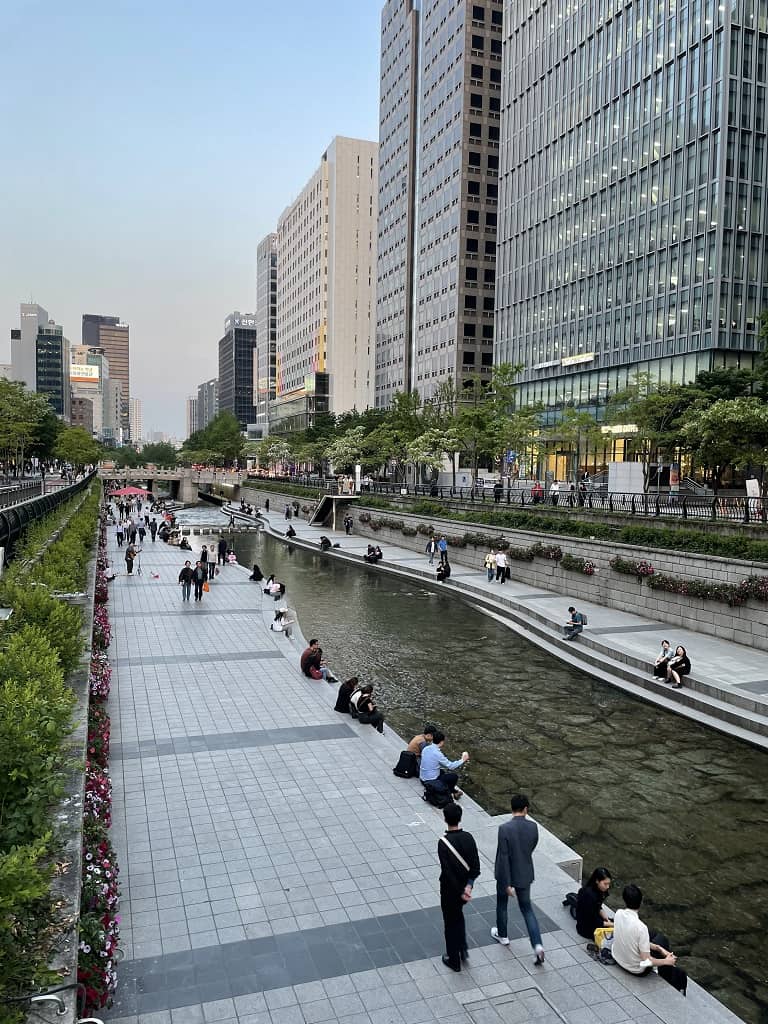
Goodbyes
Goodbyes are short. Repeat the same steps in the Greetings section minus the business card exchange.
Thank them for their time.
If your deal is important to them, you might be invited to a meal.
Expect alcohol to be involved.
Having Lunch/Dinner
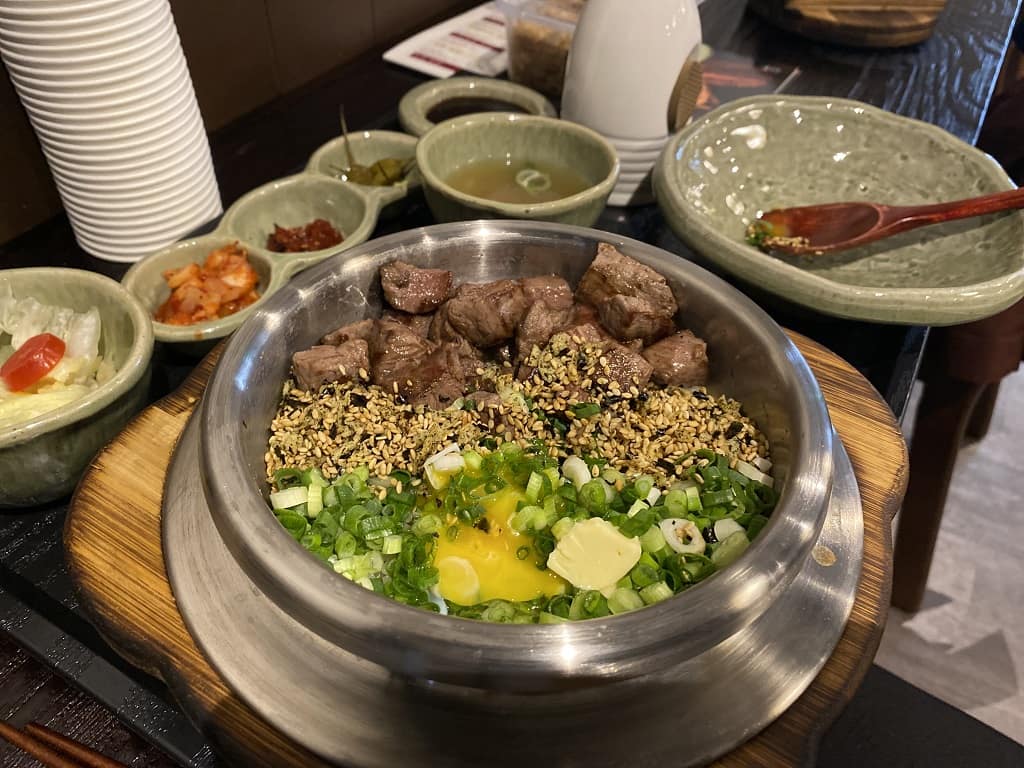
Most Korean restaurants serve a few main dishes with a variety of side dishes that you can get refilled.
The main dishes sometimes come in a large pot for everyone to share.
So, people in groups tend to order the same thing.
Feel free to order what you want at a western restaurant.
The youngest staff member in each group will set up the utensils and pour the water.
You can gauge how progressive the company is if the oldest/highest ranking person helps out.
When the oldest/highest ranking person lifts their utensils, you can begin eating.
Tips at a Korean Restaurant
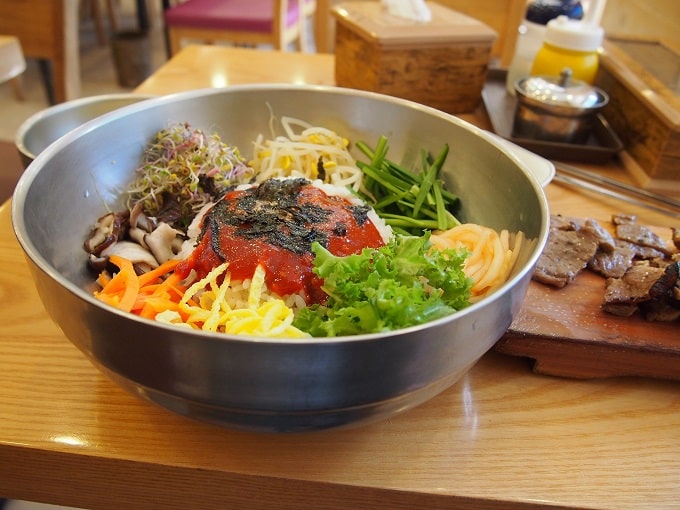
Do not lift plates or bowls while eating.
Do not use chopsticks and a spoon at the same time.
Close your mouth when chewing and try not to make noise.
When you’re done eating, put your spoon and chopsticks in their original position.
Koreans normally share side dishes, but make sure to dish them up onto your plate before eating them. Also, don’t repeatedly touch side dishes with your chopsticks.
Don’t pick up food with your hands. Even sliced fruit is eaten with forks.
Small talk during meals is uncommon, especially with middle-aged people.
Don’t talk business during meals, unless the subject is brought up first.
Seoulites tend to eat quickly by western standards.
The oldest person or the person inviting usually pays for the entire meal.
You might find yourself fighting for the check.
If you’re the seller, regardless of age, make sure to fight extra hard for the check.
If you absolutely need to pay, pretend to go to the bathroom near the end of the meal and pay at the front (this would only be acceptable if you’re a seller).
I’ve been successful with this about 50% of the time. Koreans are a lot more experienced at this intricate dance.
After Dinner
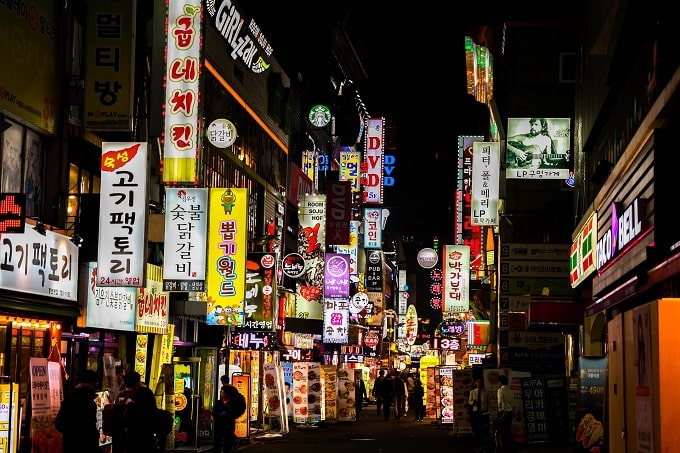
접대 (Jeopdae, wining and dining) is a very important part of business.
This is sometimes where the deal gets made.
A night out with Koreans will involve bar hopping and possibly 노래방 (Noraebang) or Karaoke.
You can be more informal (semi-formal is a good idea with basic etiquette still followed) and get to know each other better.
Don’t say no to the first shot of alcohol and make sure you finish it in one gulp (Koreans call this 원샷, one shot).
When an older/higher ranking person pours liquor for you, hold your shot glass in your right hand and touch the bottom of your right elbow or the bottom of the glass with your left hand.
This same principle applies when you pour for others.
If things get really relaxed, you might find yourself playing some drinking games.
Even if you’re reaching your limit, do the 건배 (geonbae) or “cheers” motion and lightly touch the glass to your lips and put it back on the table.
If you don’t drink at all, make sure you fill your shot glass with soft drinks and go through the motions.
The most important seat is the center furthest from the entrance.
The second most prestigious is next to the most important seat, where the two can converse.
The least important seat is near the entrance.
If you see that an older/higher ranking person’s glass is empty, pick up the bottle with your right hand as to cover the label.
Touch the bottom of your right elbow or the bottom of the bottle with your left hand.
Pour liquor (usually soju) until it fills 3/4 of the glass.
When you drink, turn your head slightly away from the older/higher ranking person and drink.
Koreans have a variety of drinking games, some involving math.
I advise you not to play them, unless you want to drink a lot.
Follow Up
Make sure to follow up in two days.
Request the information you didn’t receive during the meeting.
If you do not receive it by the date promised, call them on the phone.
Expect to follow up in a week or two.
About Contracts
Contracts should be in both Korean and English.
It’s possible for a Korean court to invalidate a contract if the counter party didn’t understand the terms.
Avoid ambiguous and inconsistent language.
A Korean court will often balance out any contract in favor of the counter party if the terms are vague.
Expect to continually renegotiate terms, even after they have been agreed upon.
Failing that, arbitration can be the next step to resolving any differences.
Of course, make sure to designate an impartial arbitrator to make sure your interests are looked after.
Korean companies often have cash-rich subsidiaries in other countries.
It’s often better to have your counter party be one of these overseas subsidiaries.
Also, designate an overseas district to enforce a contract when possible, since it’s much easier to win a judgement in a non-Korean court.
Finally, make sure that the signing party is the one with the highest likelihood of having a judgement enforced against it (this is not always the Korean HQ).
A contract in Korea is usually a loose agreement to work together in some capacity with the particulars changing to your benefit or detriment as time goes on.
Keep this in mind and focus more on the relationship to make sure things stay balanced.
Define as many terms as possible to increase clarity and not leave anything up to the courts.
This will help you understand your counter party as their definition might differ from yours considerably.
A contract doesn’t always carry the same weight as it does in other countries.
Just because something is in writing, doesn’t make it ironclad.
Always proceed with caution and use your best judgement.

My Experience Doing Business in South Korea
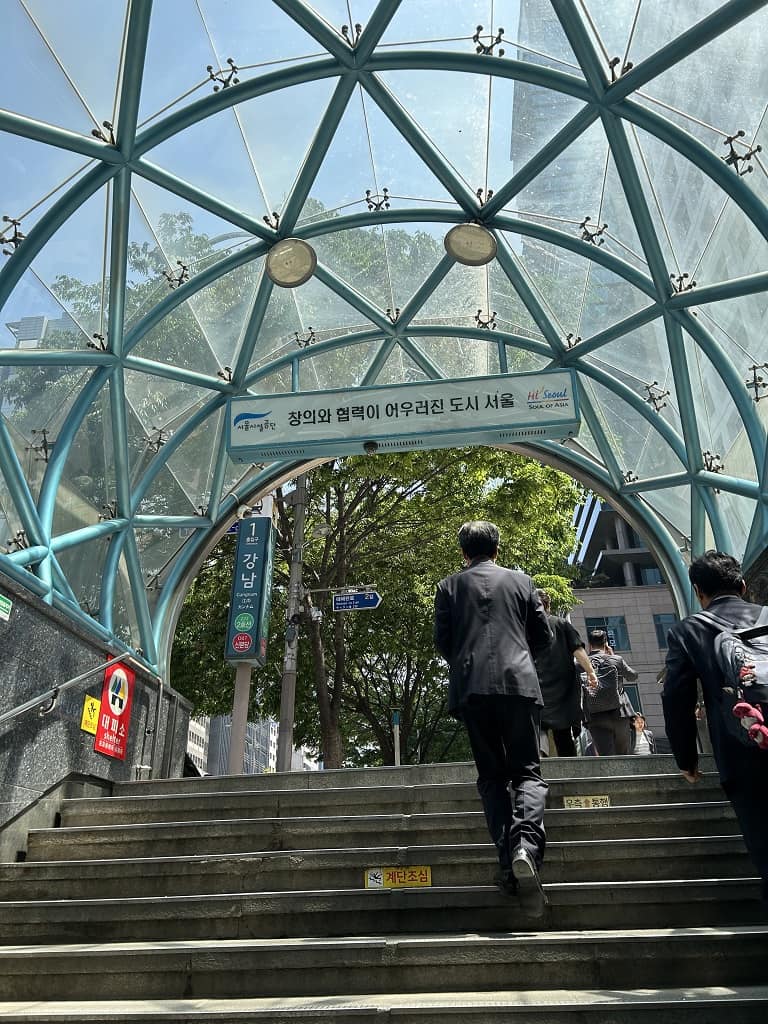
It took me a few tries to get the hang of meeting Koreans for business. There seemed to be an intricate dance that I didn’t understand.
Most Koreans learn business etiquette right after college at their first job. I started meeting Koreans in a business setting in my late 20s, so others assumed I was already aware of how to behave.
It took a lot of observation and trial and error before I was comfortable. I took solace in the fact that I had some leeway as a foreigner.
Once you get past the layer of formality, there’s a great deal of warmth and camaraderie. Business relationships can be fun, but frustrating at times if you expect things to go according to plan.
There’s truth to the idea that you can’t predict the future, and that dynamics must change to match unexpected occurrences. You’ll have an easier time if you accept that things will happen fluidly and in their own time.
Relationships are very different when you’re party B. Your role becomes more of support and entertainment. Fortunately, I had many types of jobs before, so I was comfortable switching roles when needed.
The best thing to do is keep an open mind, while knowing when the situation is deteriorating.
Korean business etiquette is a language of its own. The best way to become fluent is by practicing.
The good news is, there are plenty of companies in Korea to practice with, and you won’t be expected to know all the rules.
Building a successful partnership may take time, but comes with many rewards.
There are many ways to damage a relationship without even knowing it.
Here’s more info on doing business in Korea:
- Get a job in Korea
- Survive in Korea
- Start a business in Korea
- Write an email in Korean
- Address someone in Korean
FAQ
What’s the best time for a business meeting with Koreans?
It’s best not to schedule meetings during lunch or dinner as those times are strictly for eating. 10am-11am in the morning and 2pm-4pm in the afternoon are safe choices.
Where’s the best place for a business meeting with Koreans?
An office is the best place to have a meeting. Coffee shops are considered informal and unprofessional, although this is changing slowly.
What should I do if someone keeps cancelling or changing appointments in Korea?
Life in Korea can be hectic and unpredictable. Someone cancelling on you at the last minute doesn’t mean they’re not interested. Things really do come up suddenly and people have to do what their boss or important client asks of them. If it happens repeatedly, you need to ask yourself if they’re a reliable business partner and maybe cut your losses.
What are some things to avoid in a business meeting with Koreans?
- Running out of business cards
- Folding or writing on someone’s business card
- Making too much eye contact
- Criticizing someone’s company, business card or name
- Being too pushy or forward
- Talking about geopolitics or religion
- Being impatient
What should companies consider when doing business in South Korea?
Hiring a competent Korean staff member who was born and raised in the country or a consultant is a good idea.
Understanding how Koreans think and view the world is crucial to success, and a reliable local can provide these insights.
It’s also important to spend time building a relationship and managing staff members. Koreans are more comfortable with hierarchy and constant supervision.
This and other unforeseen costs such as entertaining clients and partners, and delays must be taken into account.
What makes doing business in South Korea a good idea?
South Korea has a large consumer economy. Its population is highly-educated and trend-sensitive with a high demand for overseas products. Also, Korean consumers are willing to pay higher prices for overseas or luxury goods.
What are political and potential risks when doing business in South Korea?
South Korea became a democracy in the 1990s and is still in a transitional period. Its financial markets are susceptible to North Korean threats and internal political changes. Foreign businesses also are at risk of IP theft.
Which market entry strategy is most attractive for doing business in South Korea?
It depends on the product or service you’re offering, but a safer bet is partnering with a Korean company to navigate local laws and customs. Costco and Starbucks have achieved success through this method.
Resources
Moa – Virtual office, coworking space
You can register your business under a Gangnam address, which provides credibility and some tax benefits.
Did we miss anything?
I learned these rules while working in Korea for over a decade.
After starting a translation company, I follow these guidelines whenever I interact with Korean clients.
Let us know your business tips in the comments below!
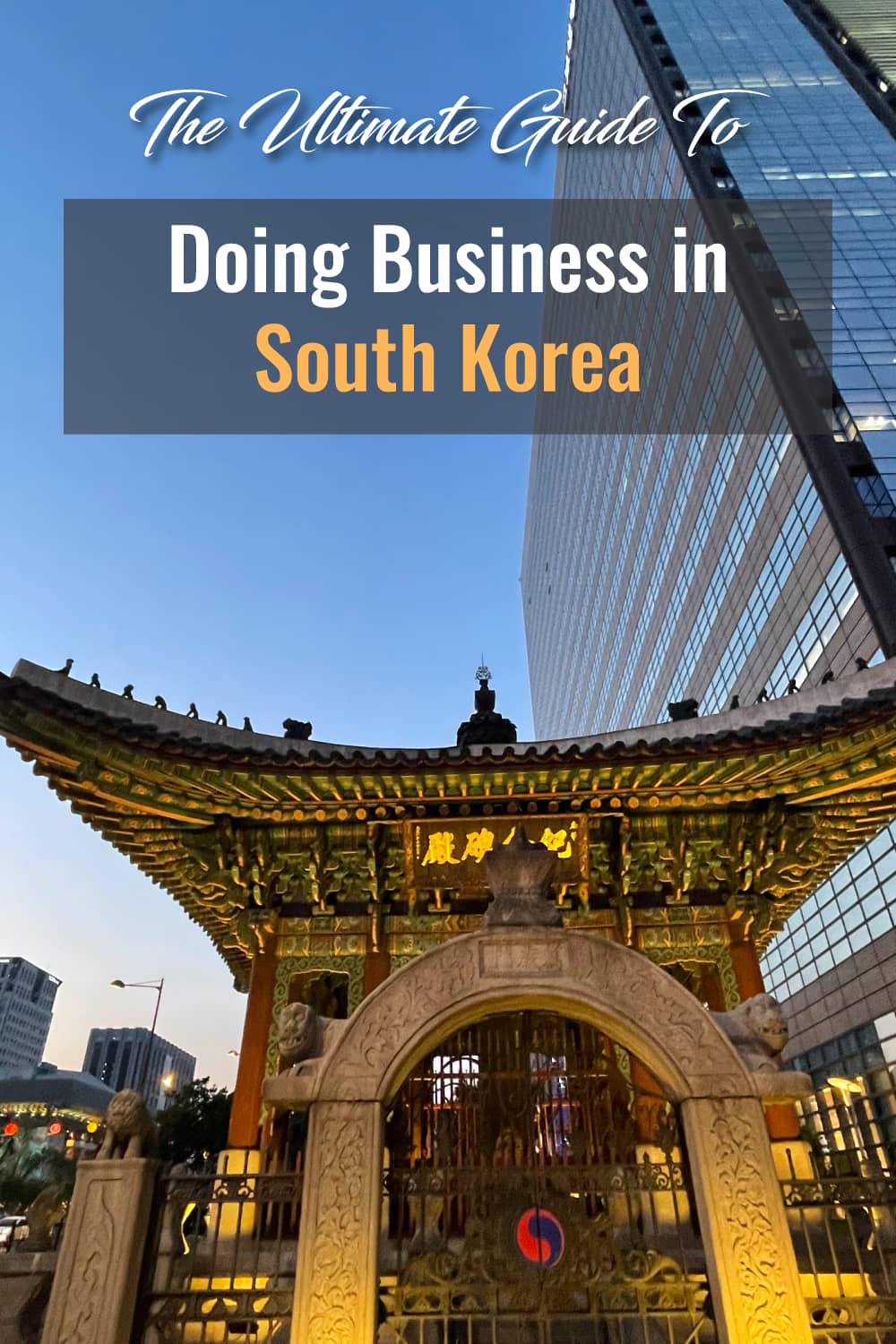


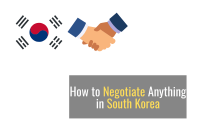
Dear Sir,
I needed your support in learning how I can get in touch with Koreans who are keen to set up business in India, as joint venture or technology transfer.
The area is from better water solutions and better air solutions.
best regards,
Col arun Sharma,
Thank you for writing, Col arun Sharma.
Maybe you might want to check out KITA or KOCHAM India.
hi sir im from philippines i want a korean supplier,like a shoes surplus
Hi Ermie,
Thanks for your comment. I think a good place to start looking would be KITA. They have a directory of potential suppliers.
You can also try Facebook Groups and Linkedin. Hope this helps!